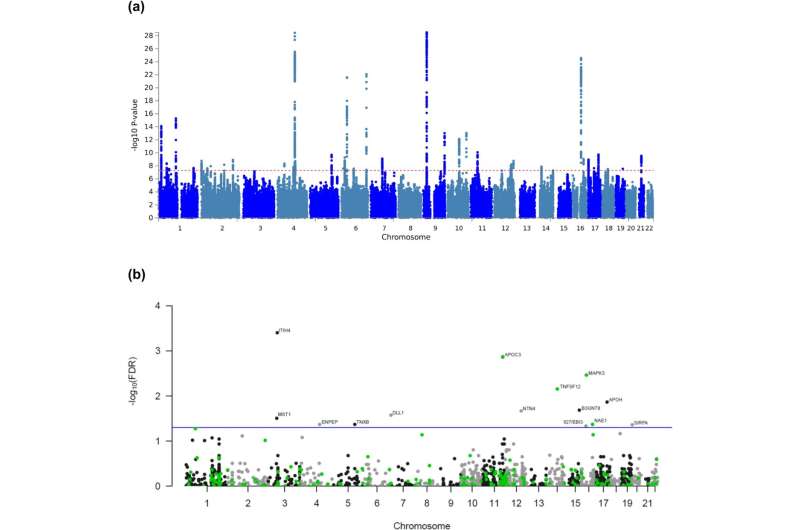This article has been reviewed according to Science X's editorial process and policies. Editors have highlighted the following attributes while ensuring the content's credibility:
fact-checked
peer-reviewed publication
trusted source
proofread
Study uncovers genetic risk factors for heart failure

In a new study co-led by investigators at the United States Department of Veterans Affairs and Brigham and Women's Hospital, a founding member of the Mass General Brigham health care system, a global team of scientists conducted one of the largest genetic association studies on heart failure to date. Using genomic data from over 90,000 heart failure patients and more than a million controls, the team identified 39 genetic mutations associated with heart failure, 18 of which had not been reported previously.
The researchers also pinpointed seven druggable proteins that, when targeted with specially designed medications, may prevent heart failure's onset. They say their overall findings, published today in Nature Communications, could one day help physicians identify and treat at-risk patients before heart failure occurs.
"Our study provides a better understanding of disease etiology, identifies causal pathways, and pinpoints potential drug targets for the primary prevention of heart failure," said lead author Danielle Rasooly, Ph.D., a research associate in the Brigham's Department of Medicine. Rasooly is also an investigator for the VA's Million Veteran Program.
Heart failure affects over 60 million people worldwide and 6 million people in the United States, costing the American health care system over 30 billion dollars every year. Patients diagnosed with heart failure have an estimated five-year survival rate of 50%, which has pressed scientists to better understand the environmental and genetic risk factors associated with heart failure.
Although several studies in the past decade have used advanced computing techniques to identify genetic risk factors for heart failure, scientists have wondered if their limited sample sizes have allowed some unidentified mutations to slip through the cracks. Genome-Wide Association Studies (GWAS), which look for differences in the DNA of patients with diseases and healthy controls, are only as comprehensive as the datasets they're built on.
GWAS with larger sample sizes have more statistical power, meaning they're able to find mutations that smaller-cohort studies may miss.
The team built their large cohort by gathering genomes from two established genomic research programs. The Million Veteran Program (MVP), a national effort launched in 2011 to examine the long-term health outcomes of United States Veterans, provided 302,287 genomes for the study. Heart failure is a particular concern for veterans, with some studies showing that they may be at a higher risk of developing heart disease. To date, over 950,000 veterans have enrolled in MVP.
"We want to thank all the veterans who have taken part in the MVP and allowed us to study how genes affect heart failure," Rasooly said.
The remaining 977,323 genomes were pulled from the Heart Failure Molecular Epidemiology for Therapeutic Targets (HERMES) consortium, which includes data from patients across several European countries. In total, the team analyzed 1,279,610 genome samples, 90,653 of which belonged to patients with heart failure.
Such a large dataset allowed Brigham and Veterans Association researchers to uncover 38 genetic mutants, or variants, that were associated with the presence of heart failure. Eighteen of those variants had not been previously reported as heart failure risk factors by smaller GWAS studies.
Investigators then conducted a technique called Mendelian randomization, which computationally simulates how certain interventions may affect disease outcomes. They searched for the genetic signatures of proteins that, when either increased or decreased in individuals in their dataset, led to lower risk of heart failure. Their approach heralded seven druggable proteins among nearly 5,000 candidates that they believe can be targeted to lower an individual's risk of developing heart disease.
The team says that their findings, coupled with future analyses to better understand the genetic determinants of heart failure, could one day empower physicians to predict whether a patient's unique genetic profile puts them at higher odds of developing heart failure during their lifetime. Drugmakers could also use the team's research to narrow down which proteins they should target in order to build drugs that minimize the risk of developing heart failure.
"It's well known that over 95% of clinical trials fail, and I think the techniques we leverage in this study can decrease this failure rate," Rasooly said. "Drug targets identified through genetics have at least twice the odds of success in drug discovery."
More information: Danielle Rasooly et al, Genome-wide association analysis and Mendelian randomization proteomics identify drug targets for heart failure, Nature Communications (2023). DOI: 10.1038/s41467-023-39253-3


















